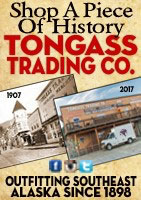The Death of a SnitchWho or what killed Tiny Walker In Ketchikan's Prohibition Days?By DAVE KIFFERJuly 18, 2021
While almost every edition of the Ketchikan Chronicle in those days had a story about an arrest for violations of either the Volstead Act or the Alaska Bone Dry Law, in truth Ketchikan was as "wet" in the 1920s at it was in the 1980s when there were more than 50 legally operating liquor licenses. It seems like every long-time family has a tale about relatives who were "rum rummers" in the 1920s. And stories about places like Buggie Beach, Charcoal Point, Ward Cove and Whiskey Cove being awash with shipments of "firewater" arriving from Canada. Plus, it seemed like just about every remote cabin in the area had "stills" or home brew operations. If you know where to look on the back side of Pennock or the southend of Gravina, you can still find the rusty remains of the stills that helped supply Ketchikan nearly a century ago. Even today,, we gleefully point out the trap doors in the old buildings Downtown where skiffs came up at high tide and unloaded their illicit cargo into the bawdy houses and afterhours clubs. But violating the anti-alcohol laws was a crime and there were indeed some real criminals involved. One of those was a man who made his way up from Seattle in the early 1920s. His real name was David I. Chess. Almost no one in Ketchikan called him David. He was better known by his AKA, Tiny Walker. Chess, a very big man, had been a professional wrestler in Seattle and Portland. His stage name was Tiny Walker. The Tiny was intended to be ironic. By 1929, he was a fixture in the local illegal alcohol scene. He ran with a very dangerous crowd, including the infamous Matt Berkovich. Berkovich would show just how dangerous when he murdered an informant in broad daylight a year later. (See "Black Matt Berkovich: A Ketchikan Story, SITNEWS, Aug. 19, 2015) Tiny Walker died suddenly on June 27, 1929, shortly after helping revenue officers intercept a load of booze. "David I. Chess, better known as Tiny Walker, died from unknown causes on the F.I.P cannery dock last night, less than an hour after he had given two federal officers information which resulted in their seizing a liquor laden car," the Ketchikan Chronicle reported on June 28. "His body showed no marks of external violence, it was announced by Dr. J. Beeson." The paper reported that Chess' body was discovered by cannery watchman Ole Johnson "lying on the board roadway leading to the canner, about 30 feet off Stedman Street. His body was against the fence. A revolver was found in his pocket." "With Chess' death, it was revealed by Fred Handy, prohibition officer, that the former wrestler and convicted bootlegger had been furnishing undercover information concerning liquor shipments for four weeks," the newspaper reported. "On the strength of information brought to them by Chess shortly after midnight, Handy and C. J. Sullivan, deputy marshal, seized a car containing three sacks of moonshine liquor at the street corner by the Ketchikan cold storage. The driver of the car escaped. A second car which the officers asserted also contained liquor, escaped by backing up at high speed to the city float, where it turned and sped away. Sullivan fired one shot in an effort to stop it, the seized car is registered under the name of Dell Stickler." Handy told the Chronicle that Walker had been giving authorities inside information after he said his cohorts framed him, leading to his arrest. "We knew that there was to be an attempt to land liquor from a boat and bring it into Ketchikan last night, so in order to fool the rum runners, Sullivan and C. J. Springer and I left here on the Cygan (a local patrol boat) last night, giving the impression that we were going out of town somewhere," Handy told the Chronicle. "About 12 miles down the channel, as pre-arranged, we were met by a gas boat which ran alongside, and without either vessel stopping we stepped from the Cygan to the gas boat. Then we came back to town going around Pennock Island and then landing at the F. I. P. dock." He said that Walker waiting at the dock with the information about the alcohol shipment. "We all ran together about 100 yards to where he had parked a car which he had brought for us," Handy said. Sullivan told the Chronicle that Walker was "apparently all right physically when we left him." “He directed us regarding turning the car around," Sullivan said. "He was found dead about 12 feet from where he stood as we drove off for Newtown.” Almost immediately, local suspicion fell upon Walker's bootlegging cohorts, particularly Berkovich who had been known to threaten anyone who crossed him. Berkovich's threats were not idle. A year later, Dec. 11, 1930, Berkovich walked into the Mint Pool Hall near the corner of Stedman and Mission streets, pulled out a .38 automatic pistol and shot Phil Dohm, instantly killing him. The month before, Dohm and Berkovich had gone on trial for bootlegging and Dohm had turned on his business partner, leading to Berkovich's conviction. After killing Dohm, Berkovich turned the gun on himself and committed suicide. The year before, Berkovich had been one of the witnesses to appear before coroner's jury that investigated Walker's death. A dozen witnesses were called before the jury. Deputy Marshal W. H. Caswell told the jury that probation officer Handy had told him that Carl Huptmann had threatened Walker previously, He said there were numerous witnesses on scene when he arrived included "women from the restricted district" as Creek Street was called in those days. Johnson, the cannery night watchman said he had seen several men on the dock that night and had seen Walker run along the walkway, fall down, get up again and finally fall down. He said he believed Walker was still alive when he reached him. He sent cannery webman Art Rehnstrom to get the police. Rehnstrom testified, confirming Johnson's recollection, the Chronicle noted. Prohibition agent Handy testified about the plan to try to trick the bootleggers. He was asked if he ever heard anyone threaten Walker. "I heard Carl Hauptmann had," Handy testified. "I heard that Matt Berkovich said he would kill him and Carl Hauptmann. Said he would run a thousand dollars' worth of car over him and kill him." Handy was asked it had ever discussed the threats with Walker. "He said Matt threatened his life," Handy answered. "Said he would kill him." Handy also testified he had witnessed a fight between Berkovich and Walker several weeks before. Berkovich was called to testify and asked if he ever had had any altercation with Walker. He said he had not and that he had not threatened him, nor did he know anyone who had. Carl Hauptmann was also called to testify said he never had any trouble with Walker, that he had no occasion to threaten him and that he didn’t know anybody who had. He said that the only time they had ever had any words was when he told Walker to keep out of the Nelson Hotel. At that time Hauptmann had told the night clerk to keep (Walker) from prowling about the hotel at all hours. But whether or not bad blood between Walker and Black Matt Berkovich played any role in the death, Dr. J.B. Beeson said the most likely causes of the death were natural. Beeson said he conducted the autopsy and noted that he found no evidence of external violence or poison. He told the jury that he had treated Walker in November of 1928 for heart trouble. "He said the nature of the trouble was a pain in the chest, a form of spasmodic heart trouble" the Chronicle reported on June 29, 1929. "The pain at the time was so severe that it was necessary to give him several treatments to relieve it." "My opinion is not based alone on the findings of the autopsy but from the knowledge of his previous trouble and from a knowledge of the excitement and circumstances surrounding this last attack," The Chronicle quoted Beeson as telling the jury. "His stomach was overloaded; he was overly fat; and the excitement and tension he was under at the time were such as to bring about such an attack. He had been running on a loaded stomach. By the findings of the autopsy he died from an acute attack of heart trouble; dilation of the heart from over exertion and excitement at that particular time. The heart was much larger than normal. The aorta was badly diseased, and the right heart dilated." Beeson also told the coroner's jury that it would be impossible to rule out poisoning without a complete examination of the contents of the dead man's stomach but that he detected no odor of poison in the stomach. "The fact that he was acting normal just before it happened and the death agony lasted only about a minute, with no convulsions are good evidence that there was no poison," Beeson testified. "Any poison that would act slowly, would have ended in convulsions and quick acting poisons would not have allowed him to wander and fall and get up as he did." The coroner's jury, made up of W. A. Bryant, Edgar Anderson, P. J. Gilmore, W. A. Pries, J. E. Thwaites and Frank Thompson, agreed with Beeson that the death was due to heart failure and that decision approved by Judge W.C. Arnold. Arnold suggested that the district attorney's office in Juneau consider a chemical analysis of the stomach contents but it is not known if that ever took place. Meanwhile, Walker's death did nothing to change the constant cycle of bootlegging and government intervention taking place in Ketchikan. Neither did the death of Berkovich a year later. The only thing that stopped it was the repeal of the Volstead Act in 1933.
Related:
On the Web:
Contact Dave at dave@sitnews.us Dave Kiffer ©2021 Publication fee required. © Representations of fact and opinions in comments posted are solely those of the individual posters and do not represent the opinions of Sitnews.
|
|||




